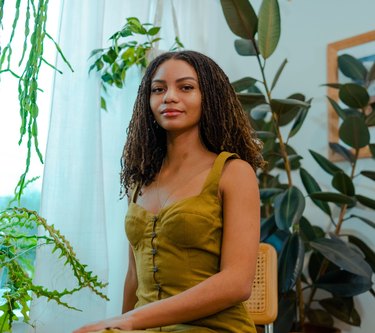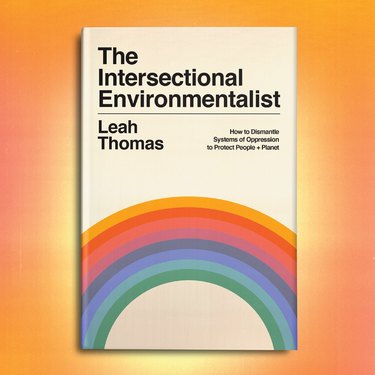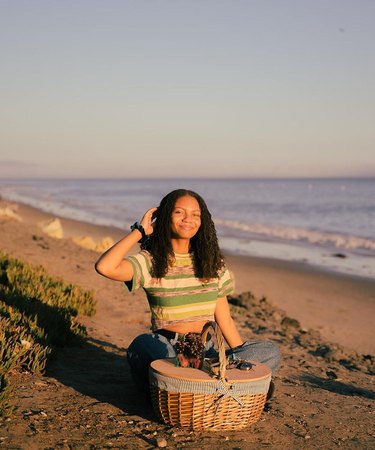When she posted the protest graphic that read "Environmentalists for Black Lives Matter" on Instagram towards the end of May 2020, Leah Thomas did not expect to garner a huge response, let alone virality. The phrase, the first image in a five-part carousel, was followed by a definition of intersectional environmentalism (IE) written by Thomas: "This is an inclusive version of environmentalism that advocates for both the protection of the people and the planet," as well as a list of actionable steps for environmentalists of color and their allies. In her caption, Thomas shared links to various organizations raising awareness about the ways in which the mainstream environmental justice movement decenters BIPOC communities, even though they experience the most risk when it comes to the climate crisis.
"I was thinking about IE, or the type of environmentalism I wanted to see. I was like, 'For this to be legitimate, there has to be a definition, so let me just make one.' And I did, just sitting there [in my bedroom]. This is what it means to me," Thomas, an environmental activist and writer, tells Hunker. She created the graphic in Canva within two hours while texting with two friends.
Video of the Day
Video of the Day
Thomas had written about intersectional environmentalism to little fanfare in the past, publishing an article in The Good Trade in 2019, where she is a frequent contributor. Furloughed from her job due to the pandemic, she watched in frustration as prominent environmental organizations remained silent amid the Black Lives Matter protests following the murder of George Floyd. For her, their silence reflected a larger issue within environmental spaces, one the Missouri native had experienced firsthand while studying environmental science and policy at Chapman University.
"Whenever I talked about race [in my classes], it was met with hostility," she says. Moreover, Thomas's studies lifted up white male conservationists like naturalist John Muir, while ignoring the contributions of BIPOC environmental activists like Hazel M. Johnson, Dr. Robert Bullard, and Vandana Shiva, among others. Thomas recalls one incident during a class about ecofeminism. "I remember being in that class and we're talking about a philosophy that in many ways was pioneered by an incredible woman in India [Shiva], and yet, the only people who are speaking about this are white people …Where are the women of color?"
After she posted the carousel, Thomas's account, @greengirlleah, amassed thousands of followers eager to know more about her inclusive approach to environmentalism and climate justice. Wishing to seize upon the newfound visibility, she worked tirelessly with a team of collaborators to channel the rising excitement into a stand-alone organization that would provide resources with the goal of dismantling systemic oppression within the environmental movement. In early June 2020, Thomas co-founded Intersectional Environmentalist, a climate justice community that centers BIPOC and historically undermined voices via speaking engagements, original content, and a forthcoming print magazine.
Around this time, Thomas also reached out to a literary agent with an idea to expand her initial definition of IE into a longer book project. While at Chapman, Thomas found joy in combining her environmental research with other disciplines like writing, design, and social media. "I can still talk about science, which is something I've always been passionate about, but I could focus on ways to communicate scientific information to the everyday person because I really think it should be accessible." A self-described eco-communicator, Thomas knew the book would be the perfect extension of her desire to disseminate nuanced discussions of environmental justice. Two years later, The Intersectional Environmentalist: How to Dismantle Systems of Oppression to Protect People + Planet, is here.
In many ways, The Intersectional Environmentalist reads like Thomas's dream textbook, the one she wanted to have as a young student. "There are so many questions that I had during school, so I tried my best to answer them in this book," she remarks. Combining her own research with personal reflections from over 30 contributors, including IE cofounder Diandra Marizet, climate justice organizer Beatrice Tulagan, and disability rights activist Ambika Rajyagor, the book serves as a primer for those both familiar and unfamiliar with the deep parallels between environmental and social justice. Alongside crash courses on terms like intersectionality — coined by scholar Kimberlé Williams Crenshaw to describe the ways in which systems of oppressions overlap for people situated within multiple identities — the book retells the history of the environmental justice movement, one that centers the many voices of environmentalists of color and their efforts to create a more equitable Earth for all.
Though the mainstream environmental movement often conjures images of middle-class white people chaining themselves to trees, Thomas stresses that these privileged communities are usually not the ones who bear the brunt of the climate crisis. Thomas points to contemporary incidents like the Flint water crisis and the Standing Rock Sioux protests against the Dakota Access Pipeline as examples of why we need a nuanced, intersectional approach to environmental issues. Moreover, her book situates these moments within a larger narrative of BIPOC activists who have been expanding the conversations around land, sustainability, and more. We learn about pioneers like Hazel Johnson, a Black environmentalist from the South Side of Chicago, who rang the alarm on the practice of placing toxic waste sites near Black and Brown neighborhoods.
Thomas believes it's crucial for all environmentalists to learn about misogyny, feminism, decolonial theory, and other concepts. "To me it makes it less complicated when you consider [intersectionality]," says Thomas. More issues abound when you try to ignore the relationship between marginalized people and our treatment of the land, and how these behaviors can be traced back to a history of colonization. We see the Earth and its people as objects to conquer or save, instead of acknowledging our interdependence on the land and each other.
Thomas hopes her book will inspire educators and organizations to shift the way they talk about environmentalism. She points to the anti-racism statements adopted by environmental organizations like Sierra Club and World Wildlife Fund as steps, while adding that there is still more work to be done.
As for the future of the IE organization, Thomas is excited to offer more programming at the nonprofit. "In April, we'll be debuting our new program, Earth Sessions, which combines music, art, community, and climate justice, and I can't wait to build it out even further."


